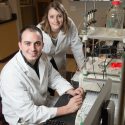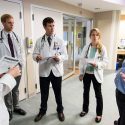Global Health Initiative sparks creative thinking with Incubator series
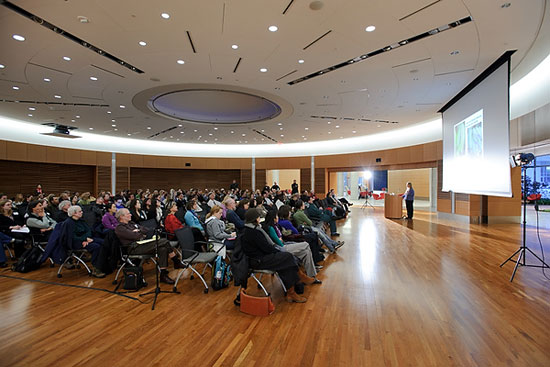
Guest presenter Caitilyn Allen speaks to an audience of more than 100 about combating global infectious diseases during the inaugural Global Health Initiative Incubator Series held at the Wisconsin Institutes for Discovery on Jan. 31, 2011. Allen is professor of plant pathology and science adviser to the dean of international studies.
Photo: Jeff Miller
If ever there were a novel approach to a global health issue, Caitilyn Allen may have found it in a radio drama produced by the Ugandan agricultural extension.
“They developed this scandalous and addictive soap opera for the radio,” Allen, a plant pathology professor who studies bacterial wilt, told the crowd Monday at the first Global Health Initiative Incubator. “In the process of the characters trying to off each other and sleeping around and all this bad behavior, there were messages embedded about being sure to cut the wilted male flowers off infected banana plants.”
Without a large extension outreach staff, it was one of the few ways Ugandan officials could get undereducated farmers to pay attention to the complex techniques required to control the spread of BXW, a bacterial disease decimating as much as 80 percent of the plants on Ugandan banana plantations.
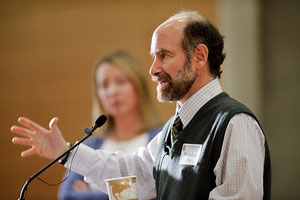
Guest presenters Jonathan Patz and Caitilyn Allen, in the background, take turns responding to audience comments. Patz is a professor in the Gaylord Nelson Institute of Environmental Studies and Department of Population Health Sciences. Allen is professor of plant pathology and science adviser to the dean of international studies.
Photo: Jeff Miller
In a country where the average citizen consumes about 500 pounds of bananas each year — “We don’t eat 500 pounds of anything per year, not even high fructose corn syrup,” Allen said — the minute bacterium was a full fledge threat to public health.
Banana prices shot through the roof while farmers were ruined. Families were pressed into food insecurity. A wave of ill-advised internal immigration brought people from rural communities into the city in search of work. Fewer children were making it to school — left out because their parents couldn’t afford books and shoes or because their families needed them to work and contribute.
And the answer might be a racy radio drama? That’s the sort of creative thinking the Global Health Initiative hopes to spark through its eight-session Incubator, built around United Nation’s Millennium Development Goals like Monday’s theme, combating global infectious disease.
“Our goal in these sessions is to stimulate discussion, collaboration and hopefully the serendipity of new discovery,” said history professor Jeremi Suri, co-chair of the Global Health Initiative.
Allen’s retelling of her Uganda experience struck a chord with Lewis Gilbert, associate director of the Nelson Institute for Environmental Studies and a member of the Wisconsin Initiative on Climate Change Impacts. The idea that researchers knew far more about the science underling a global health problem that how to implement solutions is not a new one to him.
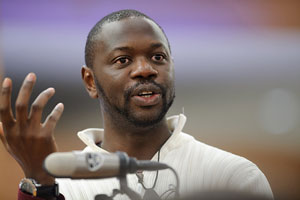
Audience member Alhaji Njai, a postdoctoral molecular and environmental toxicology researcher and native of Sierra Leone shares his comments.
Photo: Jeff Miller
“We’re finding the same problem,” Gilbert said after Allen and Jonathan Patz, an environmental studies and population health sciences professor, split the Incubator’s presentation time explaining different approaches to solving disease problems. “We know a lot more about how climate change will affect Wisconsin and what we can do about it, but we don’t understand enough about how communities make decisions to put that into play.”
For Patz, considering environmental factors as contributors to serious illness around the globe is a step toward drawing researchers who don’t normally think of their work as relevant to global health into touch with the Global Health Initiative.
Over centuries, rates of infection for maladies like tuberculosis and whooping cough in England dropped precipitously even before vaccines appeared, Patz told the Incubator crowd.
“You can see it was not medical interventions that saved the most lives,” Patz said. “Sanitation and improved environmental conditions have made major gains for us.”
But a trip to the 17th century isn’t necessary to find environmental culprits for health problems. Take the familiar American cul-de-sac. Modern lifestyles discourage physical activity and encourage fossil fuel consumption.
“The 10 leading causes of death in the United States, most of them are related to sedentary lifestyle, air pollution and automobile crashes,” Patz said.
That opens a door, Patz explained during discussion with the audience, to present climate change fixes as a way to save American lives and billions of health care dollars eve year.
“There would be enormous, immediate health benefits” if Americans drove less,” he said. “You tell people, ‘It’s a good idea anyway, even if there isn’t global warming.’”
Alhaji N’jai, a post-doctoral molecular and environmental toxicology researcher and native of Sierra Leone, joined a number of attendees in point out cultural differences as the major barrier keeping American universities like UW–Madison from working efficiently to solve global health problems around the world.
“There’s an aspect of structure that’s different there than it is here,” N’jai said of Africa. “How do you get the local population here to bring the global aspect home, to know what doctors are trying to do in a country like Sierra Leone, a country like Uganda?”
The Global Health Initiative hopes to drive conversation on that and other barriers and solutions and novel lines of research during seven more Incubator sessions. The next Incubator — on improving maternal health — will be held Feb. 14 at 4:30 p.m. in The Forum at the Wisconsin Institutes for Discovery.
While the Incubator roughly alternates weeks, the student-run Millennium Development Goals Awareness Project will run discussions for students on Incubator topics on the off Mondays from 4:30 to 6 p.m. in Grainger Hall.
It’s an all-hands-on-deck approach that Paul M. DeLuca Jr., UW–Madison’s provost, recognized as a large part of the university’s identity.
“This campus has always been socially alert, and has taken on some very far-reaching problems,” DeLuca said in opening the first Incubator session Monday. “There’s a tremendous tradition on campus of worrying about big issues.”

